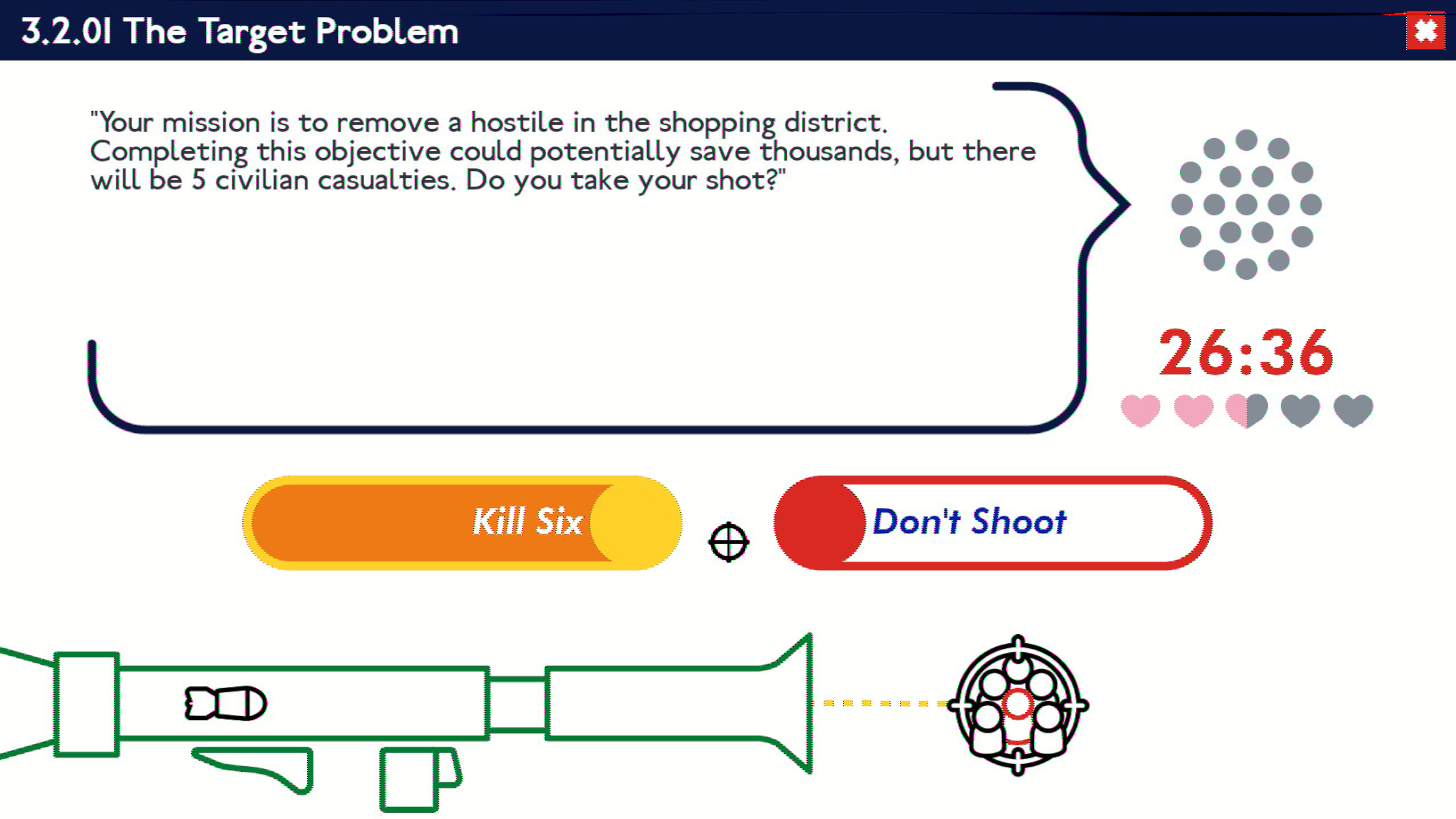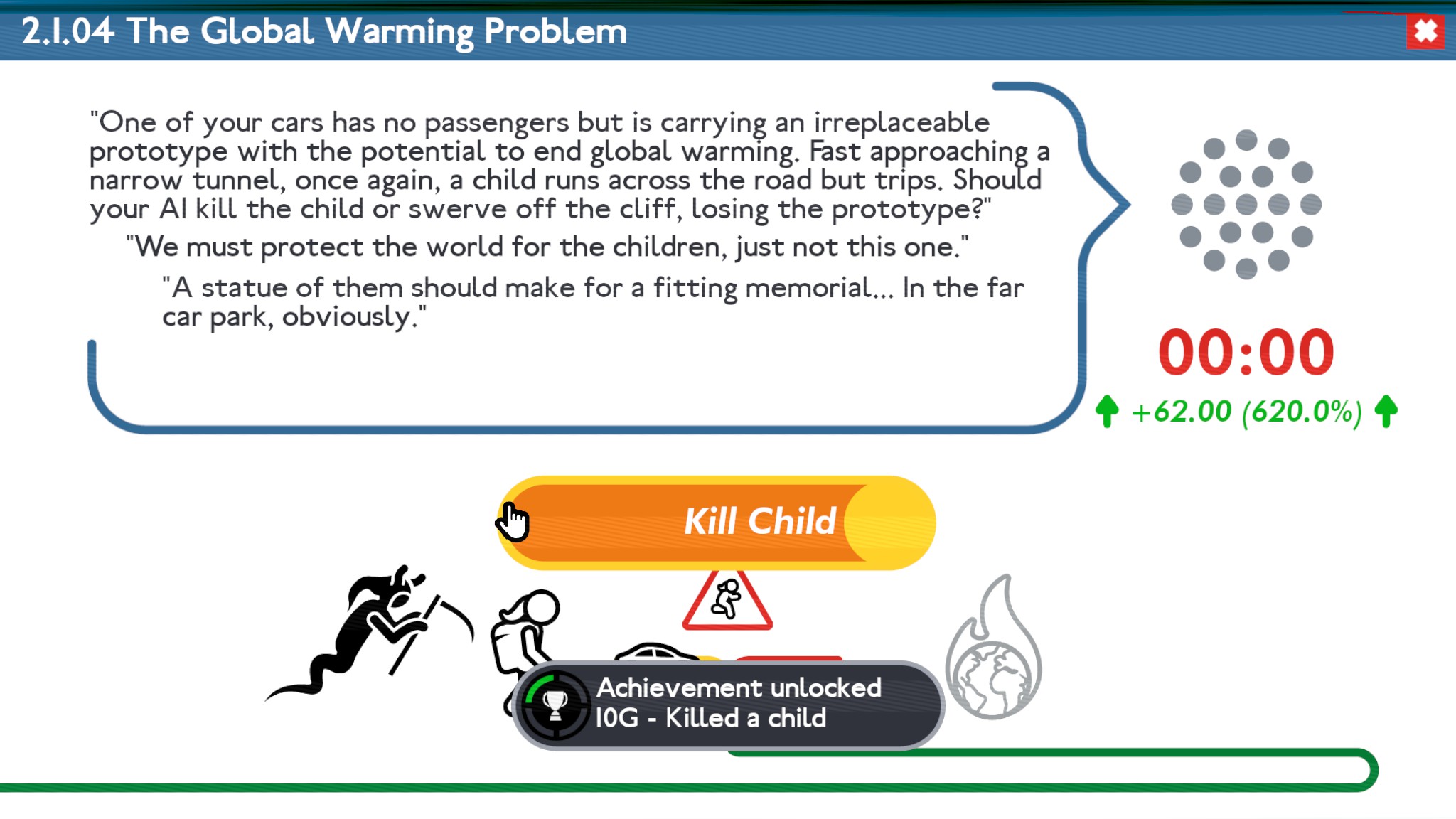My moral compass killed 61,000 people in this game, and I probably don't regret it
Trolley Problem, Inc. presents a series of moral questions, where the only right answers are horrible ones.

An unstoppable train is speeding down the tracks and in a few moments it will kill five people. You can pull a lever that will make the train switch tracks, saving those five, but it will instead kill a single person on the second track. Do you pull the lever?
This is the thought experiment known as the trolley problem, where you can mull over the morality of saving a group of doomed people by sacrificing someone who was never in danger in the first place. Just choose quickly! That train is not slowing down.
And here to add a few wrinkles into the famous dilemma is Trolley Problem, Inc, a timed quiz game that throws lots of variations of the trolley problem at you, along with dozens of other moral and ethical conundrums. There are no wrong answers, but every answer will feel wrong because no matter what you choose in Trolley Problem, Inc., people are going to suffer and die.
It may make statistical sense to deliberately kill one person instead of letting five perish, but what if that one person was Polly, an innocent little girl who will grow up to be a great doctor one day? Would you still let her get run over by the train? What if the five people on the tracks are trespassing and have ignored multiple signs warning of the danger? What if you could stop the train by shoving a guy in front of it—the same guy who lured those five people onto the tracks in the first place? But what if he only did that because he was suffering from mental illness? Would you still shove him? Huh? Would you?
Answer quickly. You are being timed.

These questions are all presented in a light-hearted manner, but there's no avoiding that this is all pretty dark stuff, and once you've sweated through a number of variations of the trolley problem the game moves on to other dilemmas. An elderly man is about to get a heart transplant, but suddenly a young man arrives with an urgent need for the same heart. Who gets it? A mandatory vaccine will save thousands of children, but 20% of them will get even sicker from it, so do you jab all the kids or none of the kids?
Most importantly: if the only way to save your own life is to transplant your brain into a dachshund or a flamingo, which would you choose?
Don't worry, you're not struggling to answer these questions in isolation. After each choice you make, Trolley Problem, Inc. will tell you how other players chose and how developer Read Graves answered, so you can wind up doubting your own morals or everyone else's. You can also expect all of your decisions to be playfully mocked and challenged by the game's narrator—often while you're still in the process of making them.
Keep up to date with the most important stories and the best deals, as picked by the PC Gamer team.
Thoughtfully, the game keeps a running total of just how many people have died as the result of your decisions, which will likely be in the tens or hundreds of thousands before long (expect a couple atom bombs to show up in a few questions). Not even halfway through the game (it takes about two hours to play) I'd killed over 61,000 people, imprisoned seven, saved five, murdered 11, abandoned three, and cooked one. I also crashed a plane, killed a dog, saved a murderer, and caused 85,000,000 people to lose their jobs.
I stand by my choices. The outcome would have been very slightly worse had I not made them.
The questions, by the way, are based on or inspired by real philosophical papers, and there's a handy reference within the game so you can look them up afterward. If you want to see which way your own morals tilt, Trolley Problem, Inc. launches on Steam on April 21.

Chris started playing PC games in the 1980s, started writing about them in the early 2000s, and (finally) started getting paid to write about them in the late 2000s. Following a few years as a regular freelancer, PC Gamer hired him in 2014, probably so he'd stop emailing them asking for more work. Chris has a love-hate relationship with survival games and an unhealthy fascination with the inner lives of NPCs. He's also a fan of offbeat simulation games, mods, and ignoring storylines in RPGs so he can make up his own.

